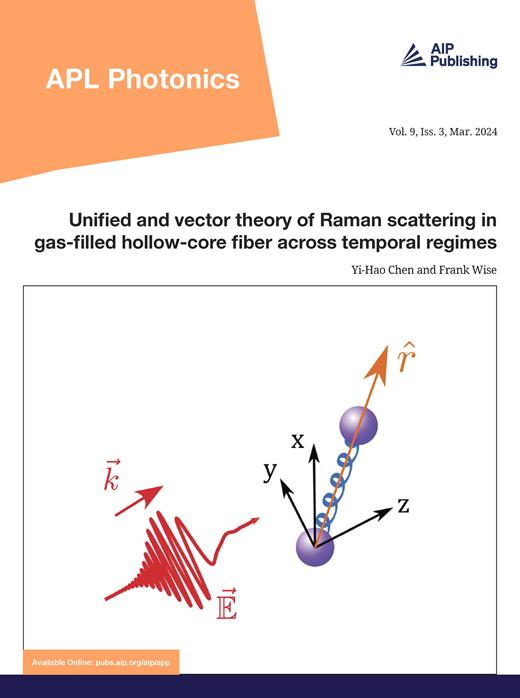用于近红外光电探测和太赫兹调制的全薄膜纳米光电 p-GeSn/i-GeSn/n-GeBi 异质结
IF 5.3
1区 物理与天体物理
Q1 OPTICS
引用次数: 0
摘要
用于红外应用的高性能合金薄膜和大尺寸薄膜晶片是国际研究人员关注的焦点。在这项研究中,使用高质量 Ge 薄膜作为缓冲层,在 5 英寸硅(Si)晶片上生长了掺杂 Ge1-xSnx 和 Ge1-yBiy 半导体合金薄膜。该研究提出了一种降低近红外光电器件暗电流密度的有效技术。通过在 Ge1-xSnx 薄膜中使用硼进行 p 型掺杂,在 Ge1-yBiy 薄膜中使用铋(Bi)进行 n 型掺杂,成功制备出了 n-Ge1-yBiy/i-GeSn/p-Ge1-xSnx/Ge 缓冲层/硅衬底结构的全薄膜平面纳米 pi-n 光电器件。对该器件的光电性能进行了测试,发现插入 p-Ge1-xSnx/Ge 薄膜后,暗电流密度降低了 1-2 个数量级。在 +1 V 的偏置电压下,最大光致发光率可达 0.8 A/W,红外光流密度为 904 至 935 μA/cm2。此外,该器件还能使用电压信号调制太赫兹波,调制带宽为 1.2 THz,调制深度为 ∼ 83%,调制速率为 0.5 MHz。这不仅清楚地展示了掺杂合金薄膜和纳米 pi-i-n 异质结的发展将如何改善光电器件在近红外和太赫兹波段的性能,而且还提出了通过单个器件实现光电互连应用的可能性。本文章由计算机程序翻译,如有差异,请以英文原文为准。
All-thin film nano-optoelectronic p-GeSn/i-GeSn/n-GeBi heterojunction for near-infrared photodetection and terahertz modulation
High-performance alloy thin films and large-sized thin film wafers for infrared applications are the focus of international researchers. In this study, doped Ge1−xSnx and Ge1−yBiy semiconductor alloy films were grown on a 5-in. silicon (Si) wafer using high-quality Ge films as buffer layers. An efficient technique is presented to reduce the dark current density of near-infrared photoelectric devices. By using boron for p-type doping in Ge1−xSnx films and bismuth (Bi) for n-type doping in Ge1−yBiy films, an all-thin film planar nano-p-i-n optoelectronic device with the structure n-Ge1−yBiy/i-GeSn/p-Ge1−xSnx/Ge buffer/Si substrate has been successfully fabricated. The photoelectric performance of the device was tested, and it was found that the insertion of p-Ge1−xSnx/Ge films reduced the dark current density by 1–2 orders of magnitude. The maximum photoresponsivity reached up to 0.8 A/W, and the infrared photocurrent density ranged from 904 to 935 μA/cm2 under a +1 V bias voltage. Furthermore, the device is capable of modulating a terahertz wave using a voltage signal with a modulation bandwidth of 1.2 THz and a modulation depth of ∼83%, while the modulation rate is 0.5 MHz. This not only provides a clear demonstration of how doped alloy films and the development of nano-p-i-n heterojunctions will improve photoelectric devices’ performance in the near-infrared and terahertz bands, but it also raises the possibility of optoelectronic interconnection applications being achieved through a single device.
求助全文
通过发布文献求助,成功后即可免费获取论文全文。
去求助
来源期刊

APL Photonics
Physics and Astronomy-Atomic and Molecular Physics, and Optics
CiteScore
10.30
自引率
3.60%
发文量
107
审稿时长
19 weeks
期刊介绍:
APL Photonics is the new dedicated home for open access multidisciplinary research from and for the photonics community. The journal publishes fundamental and applied results that significantly advance the knowledge in photonics across physics, chemistry, biology and materials science.
 求助内容:
求助内容: 应助结果提醒方式:
应助结果提醒方式:


